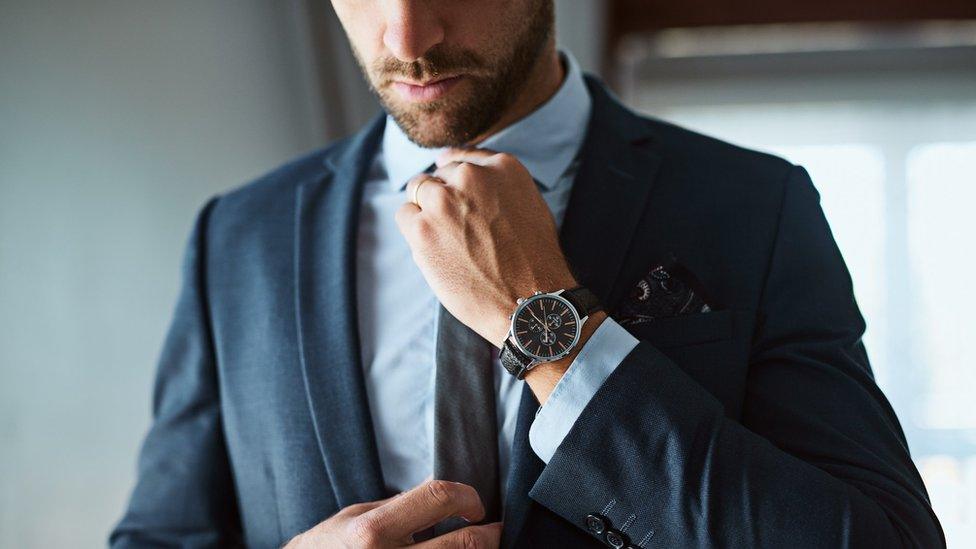Is it time to ditch the suit and tie?
- Published
- comments

Increasingly firms are telling staff it's OK to loosen their collars and change into chinos, believing that is the way to attract and retain staff.
This week, Goldman Sachs became the latest to issue new guidelines allowing more flexibility over work attire, but asking employees to "exercise good judgement" in deciding how to dress.
So does this mean it's the beginning of the end for the traditional suit and tie?

Justin Urquhart Stewart, founder of investment firm 7IM, with 300 staff

Justin Urquhart Stewart has worn his trademark red braces for the past 40 years
"You're looking after people's money, so you should behave and dress respectfully. I would not expect to hand over my pension to someone in jeans, loafers and a football shirt. It may be old-fashioned but I think it would be dangerous for a business to do that.
"The underlying element is, people will behave as they dress. If people dress in a smart respectable way, that's how they tend to behave.
"If you let people dress sloppily, that is how your brand will be perceived.
"We have been discussing recently whether to introduce dress-down Friday. We're slowly moving towards it.
"I think dress codes have to change and mature with the times. Even something as eccentric as a tattoo will develop into an acceptable fashion accessory.
"The tie will be got rid off in the next 30 years. My generation has to die out first, but in 20 years, the suit and tie will look very old-fashioned indeed. Suits will have evolved into something different, more practical, less of a uniform, but still what people perceive as respectful dressing.
"I'm attached to my red braces, because they're attached to my trousers, they're buttoned on. I've always worn them. I am out of step, slightly old-fashioned, but it isn't as if I'm going around in frock coat and frilly shirt."

Shanti Kelemen, 34, portfolio manager at Coutts

Shanti Keleman says she finds it hard to be on top of things in jeans and a T-shirt
"It depends on the image you want to project. At Coutts, we still have policy that men should wear ties when they see clients. I don't think that will change in the short run. It's part of our brand and image.
"Personally, I like dressing up. It puts me mentally in a better state of mind. I find it hard to be on top of things in jeans and a T-shirt. But I am sometimes jealous of my sister, who works from home and can wear pyjamas.
"I cycle to work, so I need clothes I can stuff in my cycling bag and can pull out unwrinkled. I leave my suit jackets at work and I wear flat shoes a lot of the time. I spend a lot of time traipsing all over the City. Heels aren't that practical.
"[I don't think there's a generational divide over dressing smartly, but if you have people from a different background, where maybe they haven't been taught what is suitable work attire, sometimes they need help in understanding jeans aren't appropriate. We have programmes at Coutts to teach those things.
"For us, we never know what a given day will have in store for us. We will always dress business-appropriate. We may go to see an entrepreneur in the morning, then someone else will drop in unexpectedly in the afternoon, and you want to be prepared."

Peter Tarrant, 77, retired chief executive of a precision engineering firm

Peter Tarrant's engineering company made parts for the Typhoon
"I have very strong views on dress code and the image that is projected. I come from a generation that values discipline and respect for authority.
"Teachers wore a suit and tie and were respected. Police would hand out on-the-spot reprimands to us youngsters and we would not dare tell our parents, as they would further reprimand us, never questioning the judgement of the police officer.
"A builder of aircraft would, I'm sure, not feel comfortable if his supplier of safety-to-life parts turned up for a million-pound contract dressed in a Hard Rock T-shirt and slashed jeans.
"Would you feel happier at your bank being addressed by a manager who indeed looks like a professional manager, not someone who popped in from the gym?
"In conclusion, dress should be appropriate for the occasion. A builder would dress differently to say a financial adviser with whom you may trust your life savings."